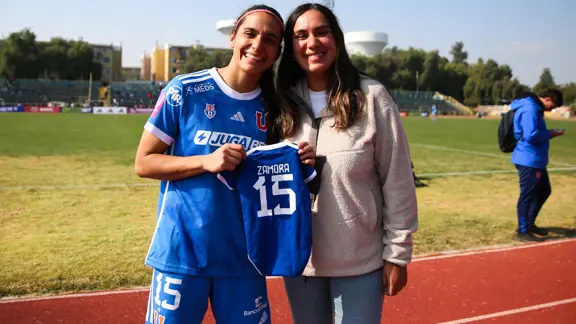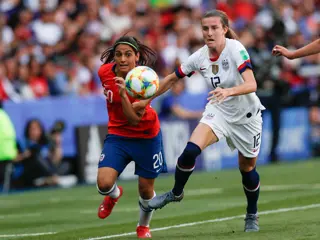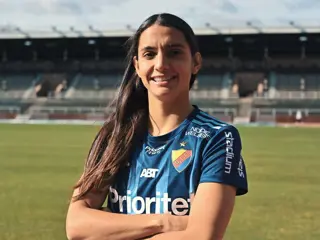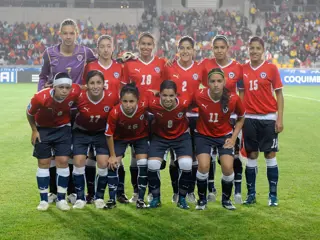Player Story
Daniela Zamora: "Our dream was to be mothers"

- Daniela Zamora, one of Chile’s leading players, spoke to FIFPRO during Pride Month
- Zamora and her partner Paz Sanchez will have a baby boy, Tomas, in September
- "It was always our dream," says the Chilean forward
29 September 2024 is marked in red on Daniela Zamora’s and her partner Paz’s calendar. It is the day Tomas, the son they have been waiting so long for, is due to be born.
"I just want the day to come," says the mother-to-be, who is none other than Daniela Zamora, one of the Chilean national team's top players. Paz Sanchez, a commercial engineer and her partner of 12 years, is six months pregnant.
"It was always our dream. We always wanted it and it cost us a lot, but luckily he’s on the way," the 33-year-old Universidad de Chile striker told FIFPRO.
FIFPRO: Can you tell us about your decision to become a mother and if you had to talk to the club about it?
Daniela Zamora: I had to talk to the club at the beginning of last year, when I had my eggs retrieved and I had to rest for about a month. I had to go and say I was going to do this process, which was three weeks or so without exercise. Luckily, I had full support from the club. I missed games but they told me that obviously this was a bigger issue. I'm super grateful because it's quite difficult for that to happen. It was easier because Paz wanted to get pregnant, so I didn't have to make the decision to stop playing.
Once Tomas is born, how would you like the support in your work environment to be?
The idea is that they give me all the facilities to be present in the weeks after the birth, enjoying those moments that are unique. Luckily, I don't have any championships outside of Chile or FIFA dates.
You recently scored a goal and did the typical baby-on-the-way celebration. Was it just a celebration or did you also want to give a message that you can play and be a mother at the same time?
It was a way to celebrate, to share that we are really happy to live each stage of something that cost us a lot. It was Mother's Day in Chile and I wanted to celebrate it, to let everyone know. But I know that it is also important: there are many girls who have written to me to know how the process has been, how we did it and where. There are many doubts about the subject and I think that from that point of view it was also very positive for my colleagues who also want to do it, but suddenly don't dare or don't have the information. It is a way of making the issues more visible, so that they are taken as more natural. Many of them thanked me for it.
How much were you encouraged by the examples of other footballers who have already become mothers?
I have seen many players with their child on the pitch and we wanted to do it before I retired. It was a dream to be with my child on the pitch after a match, to have my photo taken. You see players who have already done it and it makes you want to follow the same line. It's not easy in a society that can still be very traditional, but in the end, you have to dare. We dared and now we are enjoying it.
Speaking of traditional societies, South America has had a very conservative society despite the evolution we see today. What was your experience like when you started playing?
When I started playing football, I didn't know there was a women's national team. There was nothing to encourage girls to play football. I found out about the national team through a school championship. That's when they called me. It was difficult to go to school and say, "today I'm in the national football team, please give me permission to play". It was something very new and unknown.
But I was lucky to have the support of my school mates and then my university mates to be able to do both. And my family. When I told my mum I wanted to be a footballer, she wanted to die. She saw me studying, I don't know, medicine! It was difficult to change the expectations that I also had for myself, but luckily I felt the support. And this is one case out of a thousand because many of my classmates may not have had it and couldn't continue in this.
Is it difficult to continue being a footballer today?
It is difficult, at least for me, because of the economics of women's football here in Chile. Now there are contracts and there is much more security, but I studied information engineering and management control, and if I look at it that way, I could be earning much more than what I am earning now. That's why it's difficult to make the decision to dedicate myself to this.
I initially retired from football for four years because at that time there were no contracts, no payments, there was nothing. And I started to work. When Chile qualified for the 2019 World Cup in France I said, "I can't miss my dream, I have to try again". It was a very hard decision to make, to give up work for a dream. But with Paz's support, my passion for football won me over.
You are a reserved person but you have earned your place as a leader in the Chilean national team and in your teams. What is it like to be a leader for you?
It's a huge responsibility because especially now there are a lot of girls looking up to us and looking for leaders in us. That's why I think it's very important. It means being a good sportswoman but above all being a good person on and off the pitch. I take it to mean that I have to show positive values and be an example for the new generations.
What kind of leadership do you like to exercise?
I like them to see what a professional sportswoman is like, rather than approaching one by one and giving a talk. I like to show them how it should be or how the work leads you to win things, which is not easy. There are situations in which it is necessary to intervene, especially with younger players who suddenly don't feel comfortable or aren't really understanding how to get through difficult moments: being left off a roster or not playing. Or also at times when the dressing room is not very comfortable or there is conflict, I also take the time to bring them all together and talk things through. It's very important to have good communication, to talk about the problems that may arise. The leaders have to be the ones to generate those instances so that things can be resolved.
It was Mother's Day in Chile and I wanted to celebrate it, to let everyone know. But I know that it is also important: there are many girls who have written to me to know how the process has been, how we did it and where.
You played in Sweden for a few months, what did your time there teach you that you would like to pass on today?
I really liked the culture there. They don't care what other people do, how other people dress or what they like. They are much more distant, we are much more skin deep, but that has the nice side of living life calmly and always focused on oneself, without being aware of others.
What advice would you give to young girls who want to make their way in football?
To follow their dreams, their passion. In life, the most important thing is to be happy. And if playing football fulfils them, they should give it a try. Obviously, it's difficult but you can do it all with perseverance, dedication and hard work.
Any special advice for someone who is a member of the LGBTQIA+ community?
It is important to try. We are the ones who stop doing things or overthink things because of what people will say. It doesn't have to affect us. In the end, our happiness can't depend on others. It shouldn't. We have to be happy. I know it's difficult, but we have to go for it and live life as we want to.
It's Pride Month, what do you feel most proud of what you have achieved as a person?
I am proud of the family we have built, how brave we have been, both of us and now the three of us, to live our love and enlarge our family. It is not easy, but it was our dream and we had to pursue it.




